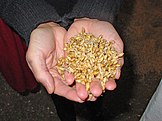Malting is a process applied to cereal grains, in which the grains are made to germinate by soaking in water and are then quickly halted from germinating further by drying/heating with hot air. Malting is thus a combination of two processes; namely the sprouting process and the kiln-drying process. These latter terms are often preferred when referring to the field of brewing for batches of beer or other beverages as they provide more in-depth information. Malted grain is used to make malt beer, malt whisky, malted shakes, malt vinegar, and some baked goods, such as bagels. Malting grains develops the enzymes that are required to modify the grain's starches into sugars, including monosaccharides (glucose, fructose, etc.) and disaccharides (sucrose, etc.). It also develops other enzymes, such as proteases which break down the proteins in the grain into forms which can be utilized by yeast. Barley is the most commonly malted grain in part because of its high diastatic power or enzyme content. Also very important is the retention of the grain's husk even after threshing, unlike the bare seeds of threshed wheat or rye. This protects the growing acrospire (developing plant embryo) from damage during malting, which can easily lead to mold growth. It also allows the mash of converted grain to create a filter bed during lautering (see brewing). Other grains may be malted, especially wheat.
Used in Alcoholic beverages, Milkshakes.
